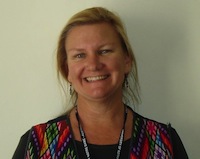Experiences in working in the physiotherapy field in Africa and Australia
Experiences in working in the physiotherapy field in Africa and Australia
By Alison Kirkman (APA Neurological Physiotherapist. Senior Lecturer, Physiotherapy. APC mentor)
I grew up in Zimbabwe and studied physiotherapy at the University of Cape Town, graduating in 1980. During the years from 1972 to 1980, there was a guerilla war being waged in Zimbabwe (Rhodesia in those days) resulting in many cases of war-related trauma. I spent several weeks of my first year uni’ vacation at a military rehabilitation centre called Tsanga Lodge in the eastern highlands. Driving along narrow winding mountain roads in an old army Land Rover without functioning windscreen wipers during a summer storm was the first of many adventures. There were about 20 young soldiers living there with a range of orthopaedic injuries caused by gunshot, shrapnel and landmine. One particular fellow had been shot from underneath as he was being airlifted away from a contact in a helicopter. He had terrible internal injuries that required ongoing surgery, but was still teased unmercifully for the indignity of having been “shot in the butt”. Several of them did not appear to have physical injuries but were extremely fragile emotionally. The diagnosis of PTSD wasn’t official in those days and many of these young soldiers were at Tsanga Lodge because there was nowhere else for them to go. I remember feeling totally inadequate and unprepared for interacting with them, especially after only a year of training, but was inspired to follow a career in neurological and cognitive therapy.
My first paid employment found me running a rehabilitation centre in a small town in Zimbabwe that had been funded and built during the Polio’ epidemic of the 1950s. There were still a few cases of polio’ occurring then because of difficulty in accessing vaccination programs in remote areas. I had a fascinatingly varied case load including strapping children with Talipes equinivarus, teaching ante-natal classes, managing the splinting and seating for local children with cerebral palsy, training and managing the injuries of the rugby team from the local Air Force base as well as treating the usual round of sore backs, necks and knees. I had my first experience of the potential of neuroplasticity when I worked with a patient who had sustained a severe head injury in a rocket attack. Despite damage to most of his left hemisphere, he was extremely motivated to return to his hobby of being a radio ham, and did so. There was certainly never a dull moment and I had workload challenges that have never been matched since.
I then returned to Cape Town and worked in private practice and in a Cerebral Palsy school before returning to Zimbabwe and my first love of rehab’ at St. Giles Rehabilitation Centre in Harare. Life after children meant squeezing in a basic Bobath course, running a neuro’ practice with a friend and supervising students at the University of Zimbabwe’s School of Physiotherapy. My experience of clinical practice in Africa has been one of constant challenge, requiring resourcefulness, creativity and wizardry in time management. People seeking treatment frequently had no access to transport, public or otherwise, so I could seldom afford to carry out a comprehensive assessment or put much time into documentation. Treatment sessions centred on advice and home management with the emphasis on problem-solving, often in unconventional ways.
In contrast, when I immigrated to Australia, I found there to be a strong focus on assessment, particularly quantitative measurement. I worked for a large organization that provides nursing home care for young people with traumatic brain injury. I had to learn about and how to use, many new assessment tools and my lack of OSH awareness drove some of my colleagues to drink. Having become accustomed to repairing anything that needed it, I found it hard to wait for the relevant accredited workman to do the task. I’m very grateful to my fellow therapists who “broke me in” to Australian ways which are very different from African ones. This experience led me to become involved with mentoring APC candidates. The emphasis on assessment and planning makes me sometimes feel there is an imbalance between the quest for evidence-based practice and more empathetic patient-centred practice. There is also the contentious issue, among neurological physiotherapists, of Bobath versus Motor Relearning approaches. Clinicians and researchers continue to differ in their opinions and the debate continues to raise collective blood pressure. In my current teaching role, I attempt to take the best of both and avoid promoting the duality.
Australian systems are exceptionally efficient and we are privileged to have access to and work within a public health care structure, second perhaps only, to those in Scandinavia.
Alice is one of the mentors on the APC Clinical Exams Preparation Course. This course has been designed for overseas physiotherapists who wish to sit the APC Clinical exams.
